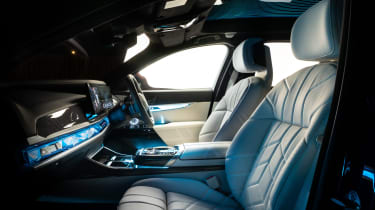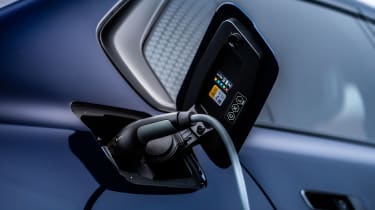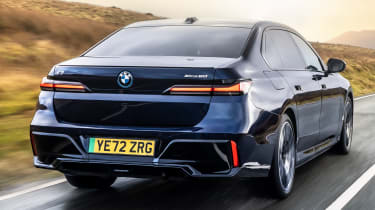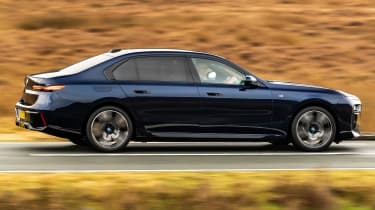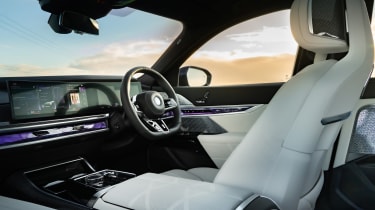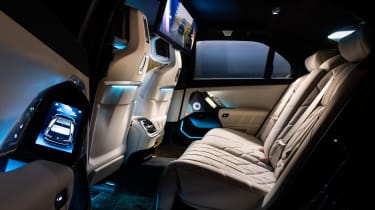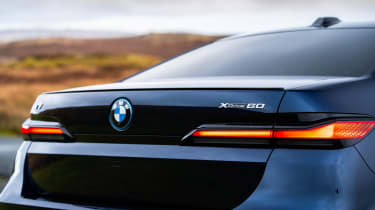BMW i7 review
Taking a different approach to its Mercedes arch rival, BMW hits the nail on the head with the first electric 7 Series
Pros
- Spacious rear cabin
- Interior technology
- Long range
Cons
- Some gimmicky tech
- Polarising looks
- Expensive options
BMW i7 verdict
Much like the bigwigs that’ll inevitably be driven around in it, the BMW i7 goes ‘big’ on everything, be it comfort, technology, performance – or even kidney grilles. BMW’s flagship boasts arguably the most impressive cabin in the already-cutting-edge electric luxury car sector, with the fold-down ‘Theatre Screen’ and funky ‘Interaction Bar’ being our particular highlights. It’s not like it's a branch of Currys on wheels, either; the BMW i7 is surprisingly accomplished for such a heavy car on a twisty road, while it offers sufficient range for long and opulent motorway stints. Move aside Mercedes, we have a new luminary of the luxury limousine market.
Details, specs and alternatives
There are some absolute non-negotiables when it comes to luxury cars: they must be comfortable, spacious, filled with the latest technology and trimmed in the finest premium materials money can buy. They should also be powerful and good to drive, whilst remaining quiet and refined. Nowhere does it say they need to be pretty though; enter the BMW i7.
Arguably the Habsburg Dynasty (look it up, you won’t be disappointed) of the luxury car sector, the BMW 7 Series lineage may have grown uglier over time, but this new electric model is nevertheless the most impressive iteration yet. Of course, it’ll have to be if it wants to be competitive against a small-yet-stellar group of rivals like the Mercedes EQS, Tesla Model S and the forthcoming Lucid Air. That’s not to mention petrol and hybrid alternatives like the Audi A8, Lexus LS and Mercedes S-Class.
Measuring almost five-and-a-half metres long, a behemoth like the BMW i7 requires a pretty substantial battery – and it gets exactly that; all versions of the i7 come equipped with a huge 101.7kWh battery pack which, if you’re interested, is well over 8,000 times the capacity of the one in your smartphone. This, according to BMW, is ample for a range of up to 387 miles, depending on specification.
With only one battery to pick from, choosing one of the three electric motor setups is pretty easy; the entry-level BMW i7 eDrive50 should offer sufficient performance for most, with its rear-mounted electric motor outputting a substantial 449bhp and hauling the as-near-as-makes-no-difference three-tonne BMW from 0-62mph in 5.5 seconds.
The dual-motor i7 xDrive60 adds an extra motor on the front axle to provide four-wheel-drive traction and an increased output of 537bhp, while if this still isn’t enough, the range-topping BMW i7 M70 xDrive produces a monstrous 650bhp and dispatches the 0-62mph sprint in just 3.7 seconds – ideal if you’re late to the company board meeting.
While the BMW i7 M70 xDrive can be considered a separate model in and of itself, ‘regular’ versions of BMW’s electric luxury saloon can be configured in one of two trim levels: Excellence and M Sport. The former is supposed to provide a more understated approach to luxury – that is, if you can ignore the i7’s huge flared nostrils – and boasts an exterior lined in aluminium and chrome. The M Sport, on the other hand, gets a more aggressive bodykit, as well as gloss black accents, upgraded brakes and larger alloy wheels.
Standard equipment is strong, regardless of which version you choose. All cars get full-LED exterior lighting, leather upholstery, heated front- and rear seats, a panoramic sunroof and a suite of driver aids including a reversing camera. Being a German luxury car, there are, of course, a multitude of optional extras; if you can afford it, we recommend splashing out on the £11,000 Executive Pack’ which includes First Class-style reclining rear seats and, perhaps most importantly, a huge 31-inch retracting ‘Theatre Screen’.
Range, battery size & charging
|
Model |
Range |
Wallbox charge time |
Rapid charge |
|
eDrive50 |
375 miles |
16hrs 15mins est. (0-100%, 7.4kW) |
34mins (10-80%, 195kW) |
|
xDrive60 |
387 miles |
16hrs 15mins est. (0-100%, 7.4kW) |
34mins (10-80%, 195kW) |
|
M70 xDrive |
343 miles |
16hrs 15mins est. (0-100%, 7.4kW) |
34mins (10-80%, 195kW) |
As mentioned, all versions of the BMW i7 come with a huge 101.7kWh (useable) battery pack, allowing for long and luxurious motorway miles. During our time with the i7 XDrive60 model, we were able to return an efficiency of well over three miles per kilowatt-hour, which translates to a range of roughly 300 miles – good for a big, heavy electric car, but quite a way off BMW’s claimed figure.
Things were even worse in the cold weather, when the i7 could only manage an average of 2.7 miles/kWh, resulting in a range of around 270 miles, almost 100 miles shy of what BMW claims. It’s worth noting, though, that the majority of EV range figures are ‘best-case scenario’ estimates, so always plan ahead if you’re looking to go on a longer journey.
Thankfully, the BMW i7 is capable of some of the fastest charging speeds of any electric car. Find a fast enough public ultra-rapid DC charger and BMW says a 10-80% top-up is possible in as little as 34 minutes. Things will take much longer if you’re charging at home via a 7.4kW wallbox, though, with a full charge taking in excess of 16 hours.
Running costs & insurance
Starting at over £100,000, the BMW i7 is far from the cheapest electric car you can buy, although if you’re able to afford one, this probably won’t bother you. If you’re lucky enough to be able to choose the i7 as your company car, you’ll be thrilled to know that it’ll ‘only’ cost you £802 per year in Benefit-in-Kind tax (that is, if you’re in the 40% income tax bracket). Like all EVs, the i7 is exempt from VED road tax and the London Congestion Charge, too.
Insurance, on the other hand, will be expensive any way you look at it; all versions of the BMW i7 occupy the top insurance group 50. At least charging an EV is less expensive than filling up a traditional ICE car with petrol; at the current average electricity rate of 30p per kWh, charging the i7 at home will cost you roughly £30. Using a public rapid DC charger will be much more expensive, though, potentially closer to £80: a lot of money yes, but still cheaper than petrol.
Performance, motor & drive
|
Model |
0-62mph |
Top speed |
Driven wheels |
Power |
|
eDrive50 |
5.5s |
149mph |
Rear |
449bhp |
|
xDrive60 |
4.7s |
149mph |
Four |
537bhp |
|
M70 xDrive |
3.7s |
155mph |
Four |
650bhp |
On the road, the i7 is quiet and it rides beautifully, even in M Sport trim with larger wheels. It isn’t totally exempt from wind- and road noise, and the electric motor isn’t completely silent, either; in fact, BMW has worked with famous movie composer Hans Zimmer to create a custom synthetic sound for the i7’s powertrains, which sounds more like something out of Interstellar than an old-school combustion engine.
As much as the BMW i7’s interior tech is perhaps its crowning achievement – more on that later – the Munich brand’s flagship model uses some pretty trick technology in order to refine the driving experience, too. Tick the Executive Drive Suspension option, and the i7 gets active roll stabilisation to keep the car flat in the bends. It works pretty well in practice and alongside the four-wheel-steering system and supple air suspension, makes the i7 a pretty effortless car to drive.
That is, if you’re not looking to tackle any twisty roads on the way to the office; the BMW i7’s powertrains all range from fast to ballistic, with flooring the accelerator the range-topping i7 M70 xDrive feeling a little like you’re putting the Starship Enterprise into warp speed. No matter which model you choose, though, the BMW i7 feels surprisingly planted and agile for such a large car, making it almost as enjoyable to drive as it is to be driven in.
Interior, dashboard & infotainment
Simply put, the BMW i7’s cabin is a beautifully-appointed, awe-inspiring place in which to spend time, boasting some of the finest materials and bleeding-edge technology in the brand’s arsenal, no matter whether you’re sitting in the front or rear.
The i7 boasts perhaps the finest integration of BMW’s dual-screen iDrive infotainment setup, with the driver having the choice to operate it via the touchscreen or an opulent-looking crystal dial in the centre console. Instead of traditional climate controls, BMW has instead opted for a more modern solution in the form of the ‘Interaction Bar’; essentially a large screen that wraps around the entirety of the cabin, this functions as a mix of interior trim, ambient lighting and switchgear and, while certainly much more fiddly than a simple knob or button, is certainly impressive to look at.
No doubt the BMW i7’s party piece, however, is the 31-inch 8K Theatre Screen that comes as part of the £11,000 Executive Package. The manner in which the display folds down from the roof is a spectacle in and of itself, with the rear blinds simultaneously closing automatically in order to give you a more cinema-like experience. You can get content from most of the popular streaming services including Amazon Prime, Netflix and YouTube and while it’d probably be more practical to give each individual passenger a smaller screen, this certainly has more wow-factor.
Boot space, seating & practicality
|
Length |
Width |
Height |
Boot space (seats up/down) |
|
5,391mm |
1,950mm |
1,544mm |
500/TBC litres |
As you’d hope for a car measuring over five metres long, the BMW i7 is very practical. There’s space for five passengers to sit comfortably, although there is a large hump in the floor, with the middle seat backrest able to fold down to become an armrest-cum-control centre for the amalgamation of tech on board.
In terms of storage, while the pockets in the door cards aren’t huge, we like how they’re lined to make sure items don’t rattle and disturb the pampered passengers. Open the rear bootlid (automated, of course) and there’s 500 litres of space to play with which, while a lot, isn’t as large, nor accessible as the 610 litre-boot in the hatchback Mercedes EQS.
Reliability & safety rating
The BMW i7 feels as premium as its price tag suggests, although the longevity of the tech on-board remains to be seen. Regardless, electric cars should, in theory, be more reliable than their petrol counterparts due to having far fewer moving parts. BMW’s flagship should be pretty safe, too; Euro NCAP gave the new BMW 7 Series and its electric counterpart the full five-star rating, with all cars coming loaded with all the latest safety kit.

